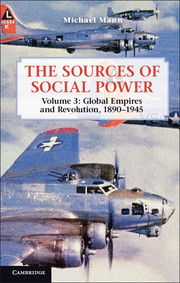Book contents
- Frontmatter
- Contents
- Preface
- 1 Introduction
- 2 Globalization imperially fractured
- 3 America and its empire in the Progressive Era, 1890–1930
- 4 Asian empires
- 5 Half-global crisis
- 6 Explaining revolutions
- 7 A half-global crisis
- 8 The new deal
- 9 The development of social citizenship in capitalist democracies
- 10 The Fascist alternative, 1918–1945
- 11 The Soviet alternative, 1918–1945
- 12 Japanese imperialism, 1930–1945
- 13 Explaining the Chinese revolution
- 14 The last interimperial war, 1939–1945
- 15 Conclusion
- Bibliography
- Index
14 - The last interimperial war, 1939–1945
Published online by Cambridge University Press: 05 November 2012
- Frontmatter
- Contents
- Preface
- 1 Introduction
- 2 Globalization imperially fractured
- 3 America and its empire in the Progressive Era, 1890–1930
- 4 Asian empires
- 5 Half-global crisis
- 6 Explaining revolutions
- 7 A half-global crisis
- 8 The new deal
- 9 The development of social citizenship in capitalist democracies
- 10 The Fascist alternative, 1918–1945
- 11 The Soviet alternative, 1918–1945
- 12 Japanese imperialism, 1930–1945
- 13 Explaining the Chinese revolution
- 14 The last interimperial war, 1939–1945
- 15 Conclusion
- Bibliography
- Index
Summary
World War II was the third Great Dislocation of the twentieth century. It was the most global, and (hopefully) both the last interimperial war and the last war to engulf Europe. It would in fact first fracture and then destroy European power. I will ask the same questions of it that I asked of World War in Chapter 5: what caused it, what determined its outcome, and what were its aftereffects? The second question must be answered mostly in terms of military power relations, and at critical moments, I will give a blow-by-blow account of the war. The other two questions require broader explanations.
Europeans date the onset of the war to September 1939, when Hitler invaded Poland; they, together with Americans, place its end at mid-1945, when Germany and then Japan surrendered. Yet this was only the central phase of a longer series of wars. Japan had attacked China in 1931 and again in 1937. Millions of Chinese were dead before either Poland or Pearl Harbor were attacked. Italy invaded Abyssinia in 1935, and with Nazi Germany helped Franco win the Spanish Civil War between 1936 and 1939. Italy invaded Albania in April 1939. Between 1936 and 1939, Hitler had managed to swallow up the Rhineland, Austria, and Czechoslovakia through aggression, but without having to fight. The war in Asia did not end until 1949, when Chinese communists defeated the KMT. The interconnections of these wars made them far more than half-global. They were started by the Axis Powers seeking to found “late” empires through military aggression believing they were establishing rights already secured by other empires. The Allies were defending their own empires. These were interimperial wars, the culmination and hubris of European traditions of militarism and imperialism, now exported to others. This was the first near-global war, for only Latin America escaped it. I dealt with the war in Asia in Chapter 12. Here I focus on the war against Germany.
- Type
- Chapter
- Information
- The Sources of Social Power , pp. 423 - 456Publisher: Cambridge University PressPrint publication year: 2012
- 1
- Cited by



